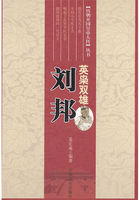Little troubles have only disturbed the surface of our nature, making it uneasy, and tossing it into fretful eddies; this heavy calamity, like a mighty wind, has plunged into the very depths, and turned up the foundations, leaving us, at length, purified and serene.I believe we shall find it to be the general testimony that those who have the least trouble are the loudest complainers; while, often, the souls that have been fairly swept and winnowed by sorrow are the most patient and Christ-like.The pressure of their woe has broken down all ordinary reliances, and driven them directly to God, where they rest in sweet submission and in calm assurance.Such is the discipline which may be wrought out for us by the departure of those we love.Such, and other spiritual results, their vanishing may secure for us, which we never could have gained by their presence; and so it may be said by some departing friend,--some one most dear to our hearts,--in a reverent sense, as the Master said to his disciples, "It is expedient for you that I go away; for if I go not away the Comforter will not come unto you."As I have already touched upon the region of speculation, Ihardly dare drop a hint which belongs here, though it grows out of a remark made under the last head.But I will say that it is not unreasonable to suppose that the departed may perform a more close and personal agency than this which I have just dwelt upon.
Often, it may be, they are permitted messengers for our welfare;guardians, whose invisible wings shield us; teachers, whose unfelt instructions mysteriously sway us.The child may thus discharge an office of more than filial love for the bereaved parents.The mother may watch and minister to her child.The father, by unseen influences, win to virtue the heart of his poor prodigal.But whether this be so or not, certain are we that the departed do discharge such an agency, if not by spiritual contact with us, or direct labor in our behalf, by the chastening influence that their memory sheds upon us, by uplifting our thoughts, by spiritualizing our affections, by drawing our souls to communion with things celestial and with God.
Let us see to it, then, that we improve this discipline; that we quench not the holy aspiration which springs up in our sorrow;that we neglect not the opportunity when our hearts are softened;that we continue the prayer which first escaped our lips as a sigh and a call of distress; that the baptism of tears lets us into the new life of reconciliation, and love, and holiness.
Otherwise, the discipline is of no avail, and, it may be, we harden under it.
And, finally, let me say, that the faith by which we regard our relations to the departed in the light that has been exhibited in this discourse, is a faith that must be assimilated with our entire spiritual nature.It must be illustrated in our daily conduct, and sanctify every thought and motive of our hearts.We should not seek religion merely for its consolations, and take it up as an occasional remedy.In this way religion is injured.It is associated only with sorrow, and clothed, to the eyes of men, in perpetual sadness.It is sought as the last resort, the heart's extreme unction, when it has tried the world's nostrums in vain.It is dissociated from things healthy and active,--from all ordinary experiences,--from the great whole of life.It is consigned to the darkened chamber of mourning, and the weary and disappointed spirit.Besides, to seek religion only in sorrow,--to fly to it as the last refuge,--argues an extreme selfishness.We have served the world and our own wills, we have lived the life of the senses, and obeyed the dictates of our passions so long as they could satisfy us, and now we turn to God because we find that he only can avail us! We seek religion for the good it can do us, not for the service we can render God.We lay hold of it selfishly, as something instituted merely for our help, and lavish our demands upon it for consolation, turning away sullen and skeptical, it may be, if these demands are not immediately answered.Many come to religion for consolation who never apply to it for instruction, for sanctification, for obedience.Let us learn that we can claim its privileges only by performing its duties.We can see with the eye of its clear, consoling faith, only when it has spiritualized our entire being, and been developed in our daily conduct.Affliction may open religious ideas in the soul, but only by the soul's discipline will those ideas expand until they become our most intimate life, and we habitually enjoy celestial companionship, and that supersensual vision of faith by which we learn our relations to the departed.
That faith let us receive and cherish.If we live it we shall believe it.No sophistry can steal it from us, no calamity make us surrender it.But the keener the trial the closer will be our confidence.Standing by the open sepulchre in which we see our friends, "not dead, but sleeping," we shall say to insidious skepticism and gloomy doubt, in the earnest words of the poet, "O! steal not thou my faith away, Nor tempt to doubt a lowly mind.
Make all that earth can yield thy prey, But leave this heavenly gift behind.
Our hope is but the seaboy's dream, When loud winds rise in wrath and gloom;Our life, a faint and fitful beam, That lights us to the cold, dark tomb;Yet, since, as one from heaven has said, There lies beyond that dreary bourn A region where the faithful dead Eternally forget to mourn, Welcome the scoff, the sword, the chain, The burning waste, the black abyss:--I shrink not from the path of pain, Which leads me to that world of bliss.
Then hush, thou troubled heart! be still;--Renounce thy vain philosophy;--
Seek thou to work thy Maker's will, And light from heaven shall break on thee.
'Twill glad thee in the weary strife, Where strong men sink with falling breath;--'Twill cheer thee in the noon of life, And bless thee in the night of death."















